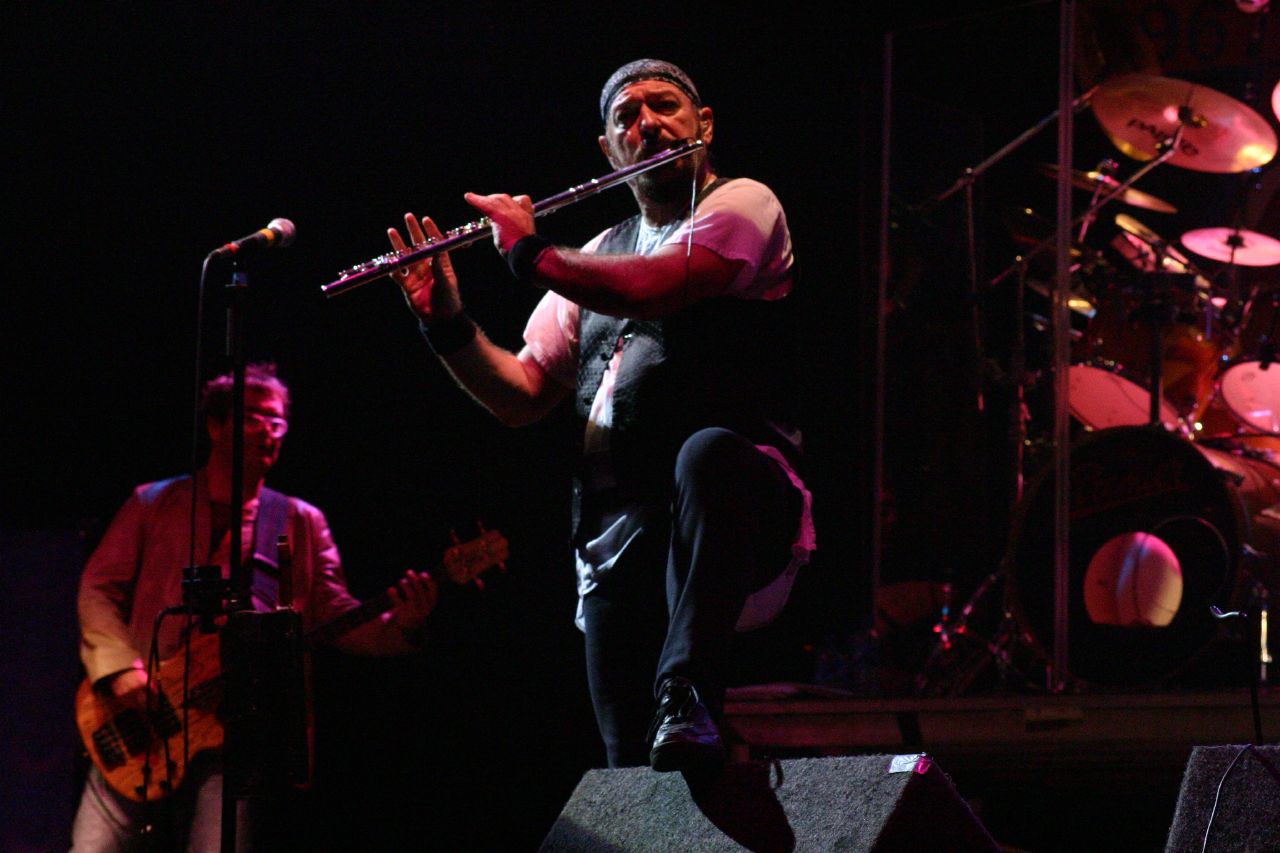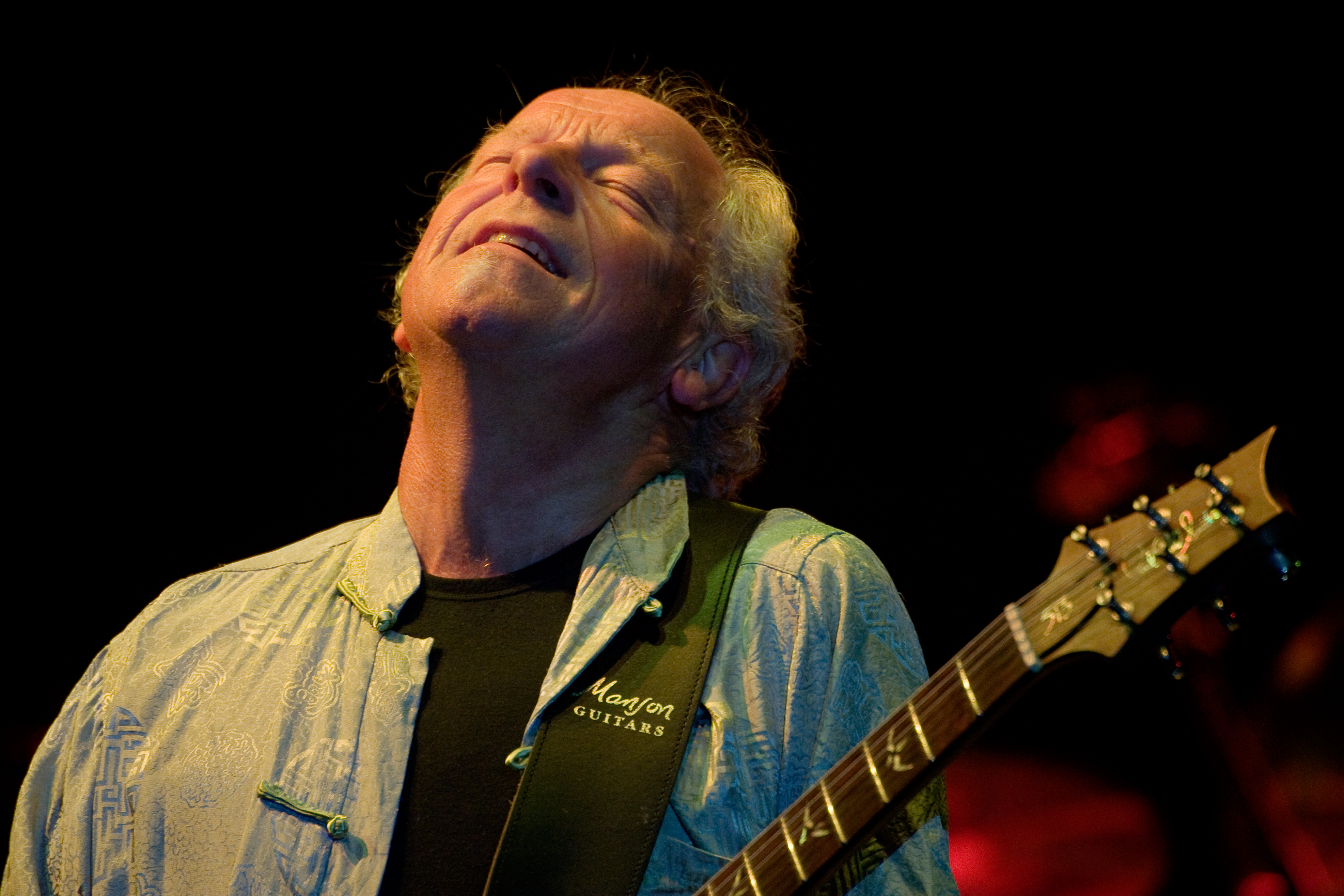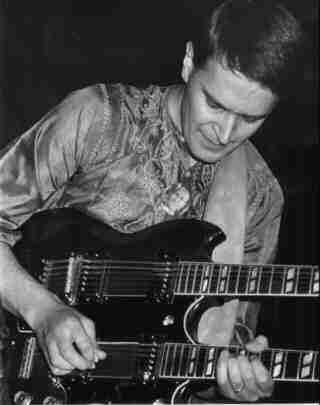|
Jethro Tull (band)
Jethro Tull are a British rock band formed in Blackpool, England, in 1967. Initially playing blues rock and jazz fusion, the band soon incorporated elements of English folk, hard rock, and classical music, forging a signature progressive rock sound. The group’s bandleader, founder, primary composer, and only constant member is Ian Anderson, a multi-instrumentalist who mainly plays flute and acoustic guitar, and is also the lead vocalist. The group has featured a revolving door of musicians throughout the decades, including significant contributors such as electric guitarist Martin Barre (the longest serving member besides Anderson), keyboardists John Evan, Dee Palmer, Peter-John Vettese, and Andrew Giddings, drummers Clive Bunker, Barrie "Barriemore" Barlow, and Doane Perry, and bassists Glenn Cornick, Jeffrey Hammond, John Glascock, Dave Pegg, and Jonathan Noyce. After achieving moderate recognition performing in the London club scene, the band released their debut album ... [...More Info...] [...Related Items...] OR: [Wikipedia] [Google] [Baidu] |
Blackpool
Blackpool is a seaside resort in Lancashire, England. Located on the North West England, northwest coast of England, it is the main settlement within the Borough of Blackpool, borough also called Blackpool. The town is by the Irish Sea, between the River Ribble, Ribble and River Wyre, Wyre rivers, and is north of Liverpool and northwest of Manchester. At the 2011 United Kingdom census, 2011 census, the Unitary authorities of England, unitary authority of Blackpool had an estimated population of 139,720 while the urban settlement had a population of 147,663, making it the List of settlements in Lancashire by population, most populous settlement in Lancashire, and the fifth-most populous in North West England after Manchester, Liverpool, Bolton and Warrington. The Blackpool Urban Area, wider built-up area (which also includes additional settlements outside the unitary authority) had a population of 239,409, making it the fifth-most populous urban area in the North West after t ... [...More Info...] [...Related Items...] OR: [Wikipedia] [Google] [Baidu] |
Glenn Cornick
Glenn Douglas Barnard Cornick (23 April 1947 – 28 August 2014) was an English bass guitarist, best known as the original bassist for the British rock band Jethro Tull from 1967 to 1970. ''Rolling Stone'' has called his playing with Tull as "stout, nimble underpinning, the vital half of a blues-ribbed, jazz-fluent rhythm section". Early life and career Cornick attended Barrow-in-Furness Grammar School for Boys, and then moved to Blackpool. The first group he played with was "The Executives", a group that played versions of famous songs in clubs and pubs. Later, he joined a soul band called John Evan SmashJethro Tull Biography at Marquee Club Retrieved 14 September 2014 in which [...More Info...] [...Related Items...] OR: [Wikipedia] [Google] [Baidu] |
Peter-John Vettese
Peter-John Vettese (born 15 August 1956 in Scotland), also known as Peter Vettese, is a Scottish keyboardist, songwriter, arranger and record producer. Vettese is perhaps best known for being the keyboardist for progressive rock band Jethro Tull for most of the 1980s. Early life Peter Vettese grew up in a musical family in Brechin, Angus, Scotland. He began his music studies with piano lessons at the age of 4. At 9, he began playing in public with his father's band. He left home at 17 to join one of the UK's biggest dance hall Big Bands, but was fired for rehearsing in company time with his own group. He then formed the jazz fusion group Solaris with guitarist Jim Condie, and toured Scotland and the US. He was playing in pubs and clubs in Scotland when he saw an advertisement for keyboard players in the music newspaper ''Melody Maker'', which turned out to be from the progressive rock band Jethro Tull. Jethro Tull Vettese joined Jethro Tull in 1982 for the recording of their ... [...More Info...] [...Related Items...] OR: [Wikipedia] [Google] [Baidu] |
Dee Palmer
Dee Palmer (formerly David Palmer; born 2 July 1937) is an English composer, arranger, and keyboardist best known for having been a member of the progressive rock group Jethro Tull (band), Jethro Tull from 1976 to 1980 (although she had worked with the band as an arranger since their inception in 1968). Early life and career She later studied composition at the Royal Academy of Music with Richard Rodney Bennett, winning the Eric Coates Prize and The Boosey and Hawkes Prize and during her studentship taught clarinet to second study students. She was appointed a Fellow of the Royal Academy of Music, Fellow of The Royal Academy of Music in 1994. Jethro Tull Going about her early career as a jobbing arranger and conductor of recording sessions, Palmer recorded her first album project, ''Nicola (album), Nicola'', in 1967 with Bert Jansch. She was then referred to Terry Ellis (manager), Terry Ellis, then manager of the early Jethro Tull, which was making its first album at Sound Tech ... [...More Info...] [...Related Items...] OR: [Wikipedia] [Google] [Baidu] |
John Evan
John Evan (born John Spencer Evans; born 28 March 1948, in Derby, Derbyshire.) is a British musician and composer. He is best known for having played keyboards for Jethro Tull from April 1970 to June 1980. Evans' father was headmaster at a Derbyshire village school and his mother was a local concert pianist and piano teacher. The family moved to Blackpool, Lancashire in October 1949. Evans was educated at Blackpool Grammar School, where he met Ian Anderson and Jeffrey Hammond, and Chelsea College, now King's College London. Early career Evans changed his name when his first band, The Blades, changed their name to The John Evan Band. Jeffrey Hammond apparently thought 'The John Evan Band' sounded better than 'The John Evans Band'. He participated in the Blackpool musical scene, with most of the musicians that would become Jethro Tull, including Barrie Barlow, Jeffrey Hammond, Glenn Cornick and Ian Anderson. Later on, Evan was attending college when he happened to recognize ... [...More Info...] [...Related Items...] OR: [Wikipedia] [Google] [Baidu] |
Martin Barre
Martin Lancelot Barre (; born 17 November 1946) is an English guitarist best known for his longtime role as lead guitarist of British rock band Jethro Tull, with whom he recorded and toured from 1968 until the band's initial dissolution in 2011. Barre played on all of Jethro Tull's studio discography except for their 1968 debut album ''This Was'' and their 2022 album '' The Zealot Gene''. In the early 1990s he began a solo career, and has recorded several albums as well as touring with his own live band. He has also played the flute and other instruments such as the mandolin, both on stage for Jethro Tull and in his own solo work. Early career Martin Barre was born in Kings Heath, Birmingham, England, on 17 November 1946. His father was an engineer who had wanted to play clarinet professionally. Barre played flute at his grammar school. When Barre bought his first guitar, his father gave him albums by Barney Kessel, Johnny Smith and Wes Montgomery to broaden his musical perspe ... [...More Info...] [...Related Items...] OR: [Wikipedia] [Google] [Baidu] |
Progressive Rock
Progressive rock (shortened as prog rock or simply prog; sometimes conflated with art rock) is a broad genre of rock music that developed in the United Kingdom and United States through the mid- to late 1960s, peaking in the early 1970s. Initially termed "progressive pop", the style was an outgrowth of psychedelic bands who abandoned standard pop traditions in favour of instrumentation and compositional techniques more frequently associated with jazz, folk, or classical music. Additional elements contributed to its " progressive" label: lyrics were more poetic, technology was harnessed for new sounds, music approached the condition of "art", and the studio, rather than the stage, became the focus of musical activity, which often involved creating music for listening rather than dancing. Progressive rock is based on fusions of styles, approaches and genres, involving a continuous move between formalism and eclecticism. Due to its historical reception, the scope of progressiv ... [...More Info...] [...Related Items...] OR: [Wikipedia] [Google] [Baidu] |
Classical Music
Classical music generally refers to the art music of the Western world, considered to be distinct from Western folk music or popular music traditions. It is sometimes distinguished as Western classical music, as the term "classical music" also applies to non-Western art music. Classical music is often characterized by formality and complexity in its musical form and harmonic organization, particularly with the use of polyphony. Since at least the ninth century it has been primarily a written tradition, spawning a sophisticated notational system, as well as accompanying literature in analytical, critical, historiographical, musicological and philosophical practices. A foundational component of Western Culture, classical music is frequently seen from the perspective of individual or groups of composers, whose compositions, personalities and beliefs have fundamentally shaped its history. Rooted in the patronage of churches and royal courts in Western Europe, surviving earl ... [...More Info...] [...Related Items...] OR: [Wikipedia] [Google] [Baidu] |
English Folk Music
The folk music of England is a tradition-based music which has existed since the later medieval period. It is often contrasted with courtly, classical and later commercial music. Folk music traditionally was preserved and passed on orally within communities, but print and subsequently audio recordings have since become the primary means of transmission. The term is used to refer both to English traditional music and music composed or delivered in a traditional style. There are distinct regional and local variations in content and style, particularly in areas more removed from the most prominent English cities, as in Northumbria, or the West Country. Cultural interchange and processes of migration mean that English folk music, although in many ways distinctive, has significant crossovers with the music of Scotland. When English communities migrated to the United States, Canada and Australia, they brought their folk traditions with them, and many of the songs were preserved by i ... [...More Info...] [...Related Items...] OR: [Wikipedia] [Google] [Baidu] |
Jazz Fusion
Jazz fusion (also known as fusion and progressive jazz) is a music genre that developed in the late 1960s when musicians combined jazz harmony and jazz improvisation, improvisation with rock music, funk, and rhythm and blues. Electric guitars, amplifiers, and keyboards that were popular in rock and roll started to be used by jazz musicians, particularly those who had grown up listening to rock and roll. Jazz fusion arrangements vary in complexity. Some employ groove-based vamps fixed to a single key or a single chord with a simple, repeated melody. Others use elaborate chord progressions, unconventional time signatures, or melodies with counter-melodies. These arrangements, whether simple or complex, typically include improvised sections that can vary in length, much like in other forms of jazz. As with jazz, jazz fusion can employ brass and woodwind instruments such as trumpet and saxophone, but other instruments often substitute for these. A jazz fusion band is less likely to ... [...More Info...] [...Related Items...] OR: [Wikipedia] [Google] [Baidu] |
Rock Music
Rock music is a broad genre of popular music that originated as " rock and roll" in the United States in the late 1940s and early 1950s, developing into a range of different styles in the mid-1960s and later, particularly in the United States and United Kingdom.W. E. Studwell and D. F. Lonergan, ''The Classic Rock and Roll Reader: Rock Music from its Beginnings to the mid-1970s'' (Abingdon: Routledge, 1999), p.xi It has its roots in 1940s and 1950s rock and roll, a style that drew directly from the blues and rhythm and blues genres of African-American music and from country music. Rock also drew strongly from a number of other genres such as electric blues and folk, and incorporated influences from jazz, classical, and other musical styles. For instrumentation, rock has centered on the electric guitar, usually as part of a rock group with electric bass guitar, drums, and one or more singers. Usually, rock is song-based music with a time signature using a verse–chorus form, ... [...More Info...] [...Related Items...] OR: [Wikipedia] [Google] [Baidu] |
List Of Jethro Tull Members
A ''list'' is any set of items in a row. List or lists may also refer to: People * List (surname) Organizations * List College, an undergraduate division of the Jewish Theological Seminary of America * SC Germania List, German rugby union club Other uses * Angle of list, the leaning to either port or starboard of a ship * List (information), an ordered collection of pieces of information ** List (abstract data type), a method to organize data in computer science * List on Sylt, previously called List, the northernmost village in Germany, on the island of Sylt * ''List'', an alternative term for ''roll'' in flight dynamics * To ''list'' a building, etc., in the UK it means to designate it a listed building that may not be altered without permission * Lists (jousting), the barriers used to designate the tournament area where medieval knights jousted * ''The Book of Lists'', an American series of books with unusual lists See also * The List (other) * Listing (di ... [...More Info...] [...Related Items...] OR: [Wikipedia] [Google] [Baidu] |




.png)

